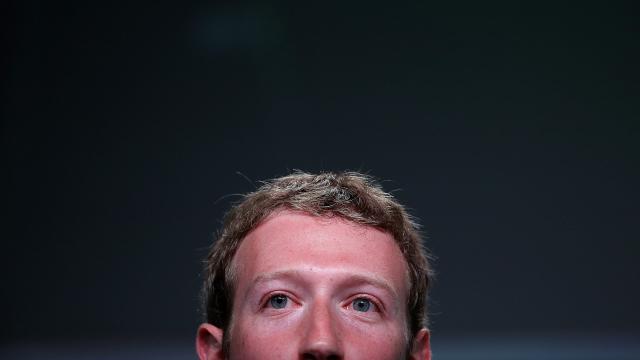Facebook held an open meeting at 10AM Tuesday morning in Menlo Park (4AM Wednesday AEDT). The whole company was invited to gather and ask questions about the recent – and rather furious – scandal around how Cambridge Analytica, a private data company hired by the Trump campaign that acquired and leveraged information on over 50 million Facebook users. Facebook general counsel Paul Grewal was at the meeting to provide some answers. Mark Zuckerberg was not.
Photo: Justin Sullivan (Getty)
Don’t act surprised. Mark Zuckerberg never shows up, when the world demands his response to something. Why should he start now?
For the record, Sheryl Sandberg was also notably absent from the meeting. She and Mark are presumably too busy trying to figure out how to bandage up Facebook’s battered reputation and possibly to stop the stock price from bleeding billions more dollars into the abyss. After the Cambridge Analytica story broke over the weekend, Facebook’s market value plummeted by a staggering $US50 billion ($65 billion).
“Mark, Sheryl and their teams are working around the clock to get all the facts and take the appropriate action moving forward, because they understand the seriousness of this issue,” a Facebook spokesperson told The Daily Beast, which first reported on Zuckerberg’s and Sandberg’s absence. “The entire company is outraged we were deceived. We are committed to vigorously enforcing our policies to protect people’s information and will take whatever steps are required to see that this happens.”
It would have been nice to hear such outrage spewing from Zuck’s mouth. But the 33-year-old university dropout doesn’t like to admit when he’s been hoodwinked. Zuckerberg also doesn’t like to suggest that Facebook’s policies enable anything except positive global change. This is the Facebook founder, CEO and boy genius who wrote 6000 words about Facebook “building global community” last year and failed to mention the word “advertising” even once. If you’d only read that sprawling essay, you might assume that Zuckerberg’s social network kept the lights with hugs and ice cream.
This, obviously, is not the case. Facebook is a data company and, whether its executives admit it or not, Facebook increasingly operates like a media company. The petrol that keeps its engines running is user data: Users’ Likes, their clicks, their friends’ Likes, their friends’ clicks and so on. In fact, thanks to some sneaky tracking technology, you don’t even have to be on Facebook’s website in order for Facebook to record your online activity. Facebook can use this data to target ads better and make more money. Companies such as Cambridge Analytica can – or at least could – use this data to help political campaigns, such as that of Donald Trump. (It’s worth pointing out here that, in 2015, Facebook shut down the API that enabled Cambridge Analytica and others to collect data not only from users but also their friends.)
But Mark Zuckerberg doesn’t want to talk about any of this unsavoury money business. There’s nothing warm and fuzzy about a massive global corporation gathering up so much data on its users that even its own engineers don’t know how much the algorithms are collecting. Mark Zuckerberg is nice-guy nerd who’s busy travelling around the United States to meet the people and learn what America’s really all about. More recently, he’s the sensitive CEO type who’s dedicating this whole year to making Facebook better, which is his job but we should applaud him for doing it, shouldn’t we?
That’s the public image Zuckerberg wants you to focus on. The other important detail to remember now that Facebook might really be screwed is the simple fact that Mark Zuckerberg sucks at damage control. In the aftermath of the 2016 US election, for instance, Zuckerberg publicly scoffed at the idea that fake news on Facebook contributed to Trump’s election. “Of all the content on Facebook, more than 99 per cent of what people see is authentic,” he wrote in a Facebook post. “Only a very small amount is fake news and hoaxes. The hoaxes that do exist are not limited to one partisan view, or even to politics.”
Two days later, one of Zuck’s lieutenants showed up with a plan to cut down on fake news and hoaxes in the News Feed. That solution actually ended up creating even more fake news, but that isn’t the point. When faced with a scandal or something that sullies his idealistic pitch for building global community, Zuckerberg will only deny what’s obvious: Facebook’s design suffers from fundamental flaws that favour data-gathering over privacy, and that model threatens the very pillars of democratic discourse. Facebook the company actually started a dialogue about this very topic earlier this year. Noticeably absent from that dialogue was one Mark Zuckerberg.
This Cambridge Analytica scandal feels different. For the first time in recent memory, it feels as though public outrage against Facebook and its sloppy data-gathering practice might actually compel the US government to respond. Senate leaders are even urging Mark Zuckerberg to testify on Capitol Hill about what’s happened instead of sending a team of lackeys and lawyers, which is what the Facebook CEO usually does.
Who knows if Mark Zuckerberg will go to Washington. Don’t count on it quite yet. If Zuckerberg can’t face his own staff, how’s he expected to sweat under the hot lights of the Senate Select Committee on Intelligence?
